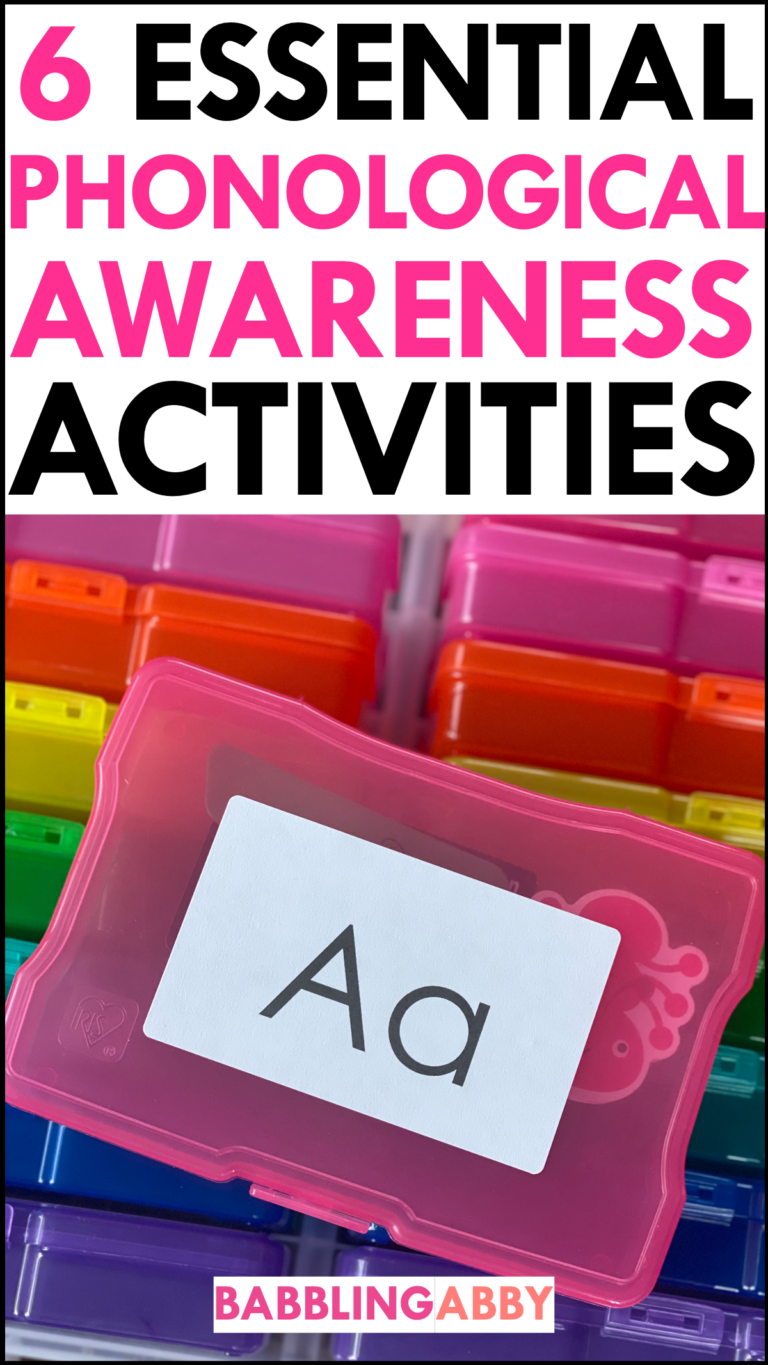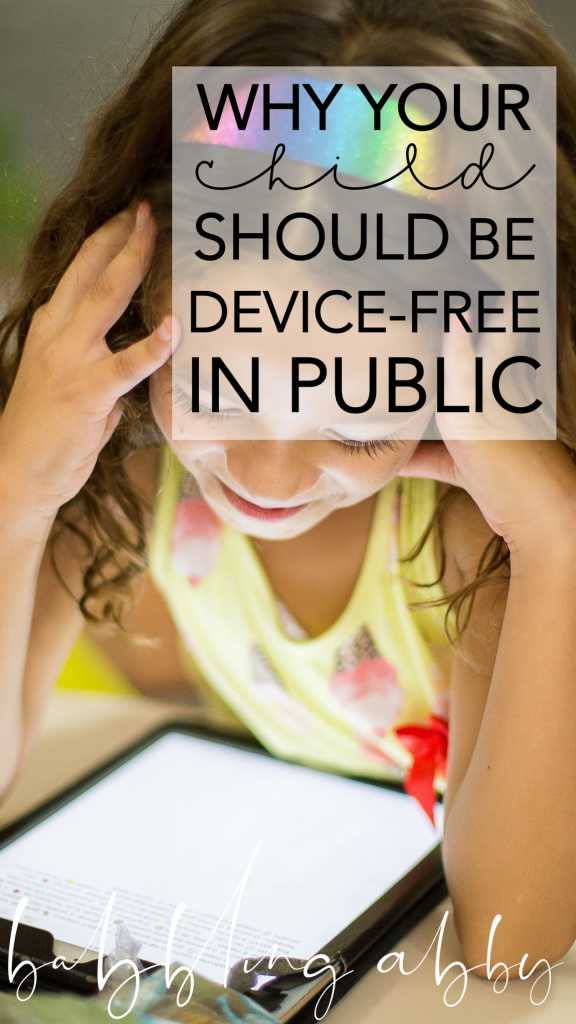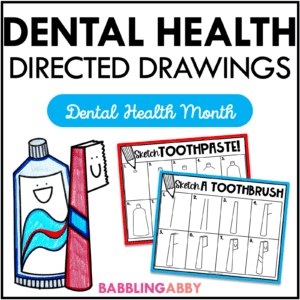

Why your child should be device free in public. The reasons your kids should not take cell phones, iPads, and gaming devices in public. Free printable for teachers to give to parents explaining why their children should avoid technology usage in public.

Recently, our daughter had speech therapy, so our two boys – ages three and ten – were stuck in the small waiting room for an hour. They spent the majority of the hour tossing a tiny ball with a toddler.
Unless we’re travelling, our kids don’t go anywhere with technology. Even then, our oldest son is the only one with any devices (he has a Kindle and a Nintendo Switch). Both are strictly monitored for content and usage. While this decision is a personal choice for our family, there are several reasons why your child should be device free in public.
Our society loves entertainment. Electronic devices have made the delivery of entertainment readily and easily accessible. However, there is immense value in boredom. Boredom allows opportunities for observation, thought processing, a quieted mind, and – perhaps most importantly – creativity!
When my own children say, I’m bored!, my most common response is: So? Boredom is okay and children need to learn how to live with it. Technology should not be used to prevent our kids from being bored.
Children are sponges who soak up new learning experiences daily. Though the classroom provides opportunities for academic knowledge, it is outside the school building where they learn and practice a variety of other necessary and important life skills. This includes everything from learning how to order a meal at a restaurant to asking for directions to civilly cheering on a sports team. The list goes on and on. A classroom cannot replicate these types of authentic learning experiences. It’s our job as parents to be the teachers.
Furthermore, our kids learn a lot by watching us. Shopping for groceries and comparing prices. Offering help to someone in distress. Finding our way from a parking garage to an appointment. Responding to someone who is rude. Using signs to navigate directions. Initiating and maintaining conversations. An electronic device is an unnecessary distraction from learning all of these things and more.
As the parent of three (soon to be four) children, I completely relate to the need to get through a store, sports practice, or doctor’s office visit with as little drama as possible. I often feel like we’re a travelling circus. I have spent many trips to the store redirecting little hands, breaking up spats, and corralling my kids through the aisles. It is rarely easy.
But, I do not rely on an electronic babysitter. Instead, I anticipate that they might misbehave, someone might cry, and I’ll probably wind up exasperated by the end of the trip. They’re kids and I’m a mom. It’s how childhood and parenting works.
However, by putting a device in front my children in public places, I am actually suppressing their natural inclination to be kids. To look around, observe, explore and engage with their surroundings. I would also deny them any opportunity to learn how to express their emotions and control their behaviors appropriately when certain situations arise (like being told No, for instance).
My husband and I aren’t parenting geniuses. We’d never claim to be experts. Ever. Our kids aren’t perfect, our minivan is a wreck, we eat fast food, our kids wear hand-me-downs, and we yell too much sometimes. Our parenting strategies are constantly evolving. I cringe when others try to tell me how to parent my own kids or give unwanted advice.
So, please read this without any finger wagging in front of your face trying to tell you how to be a mom or a dad. Instead, it’s a simple reminder from one parent to another that we’re all raising children to be considerate, engaged, culturally responsible adults someday.
An iPad, phone, laptop, portable gaming device, or tablet CANNOT and WILL NOT replicate the experiences our world has to offer. They’re distractions from living. From learning to be a human.
Do you currently allow your kids to take their devices out in public? That’s okay! It’s never too late to set a new standard. Simply explain that they will no longer be allowed to take their devices out of the house. If they’re old enough, discuss the rationale behind the decision and the long-term benefits. Will they whine and complain? Likely. Good news: they’ll survive and adapt. Hopefully, they’ll thank you someday 🙂
While I haven’t had the chance to read it yet, this book came highly recommended from a friend.
The author, a psychiatrist, developed a four-week electronic fast for her patients and documents the results.
From the description on Amazon…
Dr. Dunckley has found that everyday use of interactive screen devices — such as computers, video games, smartphones, and tablets — can easily overstimulate a child’s nervous system, triggering a variety of stubborn symptoms. In contrast, she’s discovered that a strict electronic fast single-handedly improves mood, focus, sleep, and behavior, regardless of the child’s diagnosis.
PURCHASE Reset Your Child’s Brain HERE
I recently wrote a post that can help you teach young children about limiting screen time. Read more HERE.
I created a free printable that you can reproduce to help you educate parents and families about this topic. It highlights the many reasons why your child should be device free in public. Feel free to download HERE or by clicking the graphic below.
I would love to know your thoughts about this topic in the comments. Please engage in friendly dialogue there!
These FREE resources are an instant download upon a confirmed subscription.
Yay! I'm so excited to connect with you! Now check your email to confirm your subscription. You freebies will download instantly upon confirmation 🙂

Abby is a former kindergarten and first grade teacher who channels her passion for education into creating engaging activities and resources for the kindergarten and first grade classroom. When not dreaming up or working on her next project, you’ll find her enjoying her family – most likely in her minivan on the way to a soccer field.





Help your students build their phonemic awareness with this simple segmenting activity. Get 25 FREE practice pages sent to your inbox today.
©2022 Babbling Abby. All Rights Reserved.